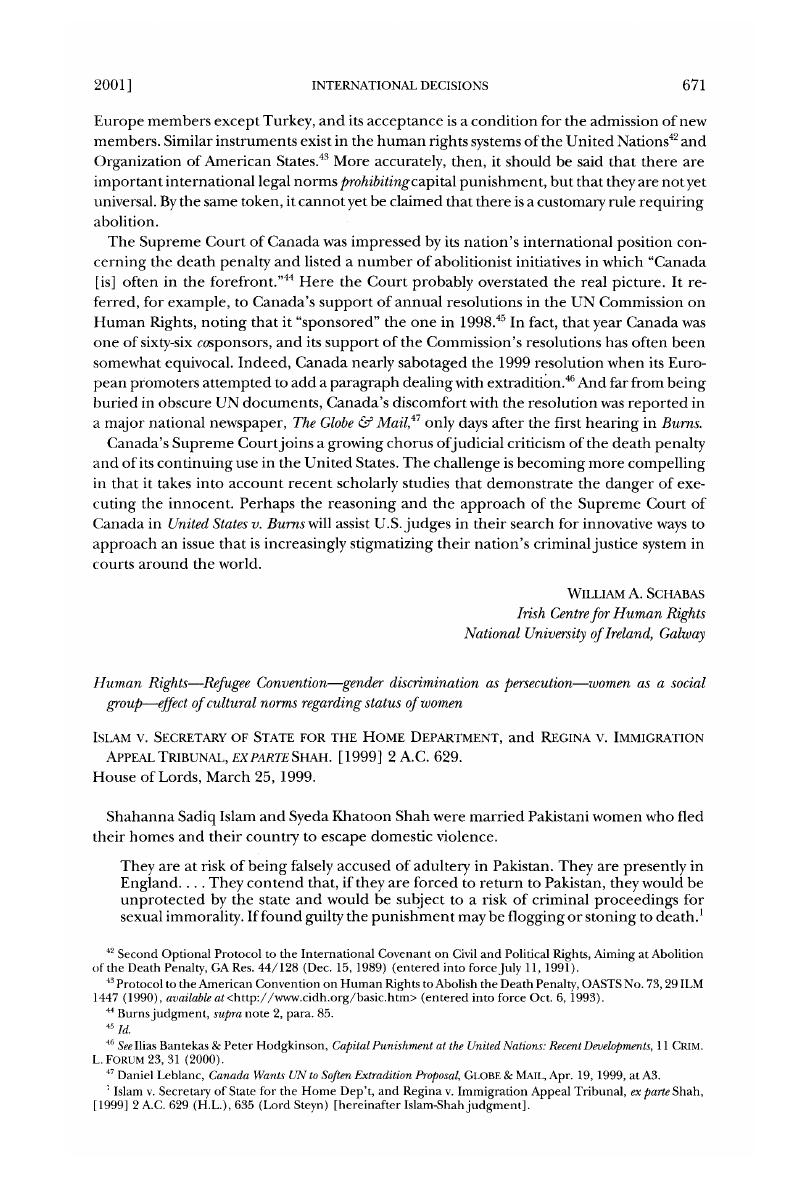No CrossRef data available.
Published online by Cambridge University Press: 06 June 2017

1 Islam v. Secretary of State for the Home Dep’t, and Regina v. Immigration Appeal Tribunal, ex parte Shah, [1999] 2 A.C. 629 (H.L.), 635 (Lord Steyn) [hereinafter Islam-Shah judgment].
2 Convention Relating to the Status of Refugees, July 28, 1951, 189 UNTS 150, as amended by Protocol Relating to the Status of Refugees, Jan. 31, 1967, 19 UST 6223, 606 UNTS 267.
3 Id., Art. 1(A)(2).
4 Islam-Shah judgment, supra note 1.
5 Id. at 644-45 (Lord Steyn), 652 (Lord Hoffmann), 658 (Lord Hope of Craighead).
6 Id. at 645 (Lord Steyn) (accepting this group as an alternative to “women in Pakistan”). The shorthand used by the Court for this three-part test—” [t] he unifying characteristics of gender, suspicion of adultery, and lack of protection,” id.—creates some confusion concerning the meaning of “lack of protection.” In his dissent, Lord Millett sometimes takes the phrase to refer to women’s being “unprotected by their husbands or other male relatives,” id. at 662. Lord Craighead, id. at 656, uses but does not further discuss his own variation on the same phrase. The two judges in the majority who probe the issue of the lack of protection (Lords Steyn and Hoffman) consistently conceive of it in terms of the state’s failure to protect.
7 Id. at 658-59 (Lord Hutton) (accepting this group as a particular social group and reserving his position on the broader group, “women in Pakistan”).
8 Id. at 646 (Lord Steyn), 653 (Lord Hoffmann).
9 Id. at 648 (Lord Hoffmann).
10 Id.
11 Id.
12 See id. at 635-36 (Lord Steyn), 647 (Lord Hoffmann). Lord Steyn includes a long quotation describing Pakistan’s Evidence Act and Zina Ordinance, as well as their implications with respect to married women and extramarital sex. For example, if a woman is raped and criminal charges are brought, she must prove lack of consent to intercourse, failing which she may be convicted for illicit sexual activity. In other situations involving extramarital sex, the testimony of the married women involved is inadmissible or given less weight than that of men.
13 Id. at 646 (Lord Steyn), 654 (Lord Hoffmann).
14 Id. at 642-43 (Lord Steyn), 651-52 (Lord Hoffmann), 657 (Lord Hope of Craighead), 661 (Lord Millett).
15 Id. at 639-40 (Lord Steyn), 650 (Lord Hoffmann, commenting on the decisions at first instance), 656 (Lord Hope of Craighead), 662 (Lord Millett).
16 Id. at 644 (Lord Steyn), 663 (Lord Millett).
17 Id at 644 (Lord Steyn).
18 Id at 663 (Lord Millett).
19 Id.
20 Id.
21 Id. at 664-65 (Lord Millett).
22 Id. at 663 (Lord Millett).
23 In re Acosta, 191. & N. Dec. 211 (1995); see James, C. Hathaway, The Law of Refugee Status 160–61 (1991)Google Scholar. The Supreme Court of Canada has adopted the Acosta approach, see Canada (Attorney General) v. Ward, [1993] 2 S.C.R. 689, available at <http://www.lexum.umontreal.ca/csc-scc/en/index.html>.
24 Islam-Shah judgment, supra note 1, at 652 (Lord Hoffmann).
25 Id. at 648 (Lord Hoffmann).
26 See Neil S. Jacobson & John, M. Gottman, When Men Batter Women: New Insights Into Ending Abusive Relationships 268 (1998)Google Scholar.
27 For descriptions of the origins and an application of the test of due diligence to domestic violence, see Radhika Coomaraswamy, Report of the Special Rapporteur on Violence Against Women, Its Causes and Consequences, paras. 32-39, UN Doc. E/CN.4/1996/53 (1996). See also Anker, Deborah, Gilbert, Lauren, & Kelly, Nancy, Women Whose Governments Are Unable or Unwilling to Provide Reasonable Protection from Domestic Violence May Qualify as Refugees Under United States Asylum Law, 11 Geo. Immigr. L.J. 709 (1997)Google Scholar.
28 Coomaraswamy, Radhika, Preliminary Report Submitted by the Special Rapporteur on Violence Against Women, Its Causes and Consequences, para. 119, UN Doc. E/CN.4/1995/42 (1994)Google Scholar.
29 In the Australian context, see Mark Finnane, Police and Government 104-10 (1994), cited in Simon Bronitt & Bernadette Mcsherry, Principles of Criminal Law 756 (2001).
30 Islam-Shah judgment, supra note 1, at 654 (Lord Hoffmann).
31 Id.
32 Id. at 654-55 (Lord Hoffmann).
3S For a detailed discussion of failed states and other situations in which the state fails to provide protection from nonstate actors, see Moore, Jennifer, From Nation State to Failed State: International Protection from Human Rights Abuses by Non-State Agents, 31 Colum. Hum. Rts. L. Rev. 81 (1999)Google Scholar.
34 Bronitt & McSherry, supra note 29, at 757 (includes further references).
35 See supra notes 9-12 and accompanying text.
36 Islam-Shah judgment, supra note 1, at 644-45 (Lord Steyn), 652-53 (Lord Hoffmann).
37 See supra note 17 and accompanying text.
38 See supra notes 17-20 and accompanying text; see also supra note 15 and accompanying text.
39 See Mathew, Penelope, Conformity or Persecution: China’s One Child Policy and Refugee Status, 23 U. New S. Wales L.J. 103 (2000)Google Scholar (see especially 127-28).
40 Susan Musarrat, Akram, Orientalism Revisited in Asylum and Refugee Claims, 12 Int’l J. Refugee L. 7, 19 (2000)Google Scholar.
41 Id.
42 Macklin, Audrey, Refugee Women and the Imperative of Categories, 17 Hum. Rts. Q. 213 (1995)Google Scholar.
43 For the contrary argument that some cases of domestic violence may be dealt with under the rubric of political opinion, see Anker, Gilbert, & Kelly, supra note 27, at 741-42.
44 See In re R-A-, Interim Decision 3403 (BIA June 11, 1999), vacated by U.S. attorney general (Jan. 19, 2001), at <http://www.usdoj.gov/eoir/efoia/bia/biaindx.htm>.
45 Guidelines were adopted in the United Kingdom well after the Islam-Shah decision. See U.K. Immigration Appellate Authority, Asylum Gender Guidelines (Nov. 2000), at <http://www.unhcr.ch/refworld/refworld/legal/refpol/Ukgender.pdf>.
46 See Minister for Immigration and Multicultural Affairs v. Khawar (2000) 101 FCR 501 (Fed. Ct. Austl. 2000) (three-judge panel), aff g (1999) 168 ALR 190 (Fed. Ct. Austl. 1999) (Australia’s gender guidelines are referred to). Special leave to appeal to the High Court of Australia has been granted. The decisions are available online at <http://www.austlii.edu.au>.